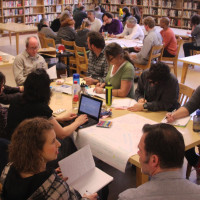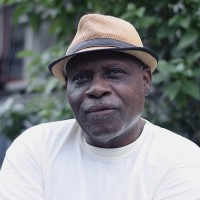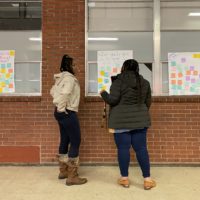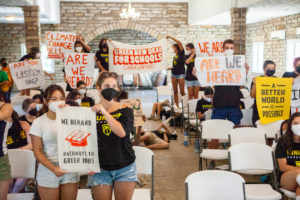
Across the country, youth are ready to fight.
Starting Sept, 2023, the Sunrise Movement, a youth-led political action organization fighting climate change, is launching its Green New Deal for Schools campaign in 50 high schools throughout the nation.
This campaign’s launch will coincide with New York Democratic Rep. Jamaal Bowman’s reintroduction of the Green New Deal for Public Schools to Congress on Sept 28. The legislation would allow the Sunrise Movement’s campaign to be implemented at a national scale with federal funding.
The same day the bill is introduced, roughly 200 youth climate activists affiliated or in solidarity with the Sunrise Movement will gather at Capitol Hill in Washington, D.C., to garner support for the campaign and congressional bill.
“If it is coming from students, then it means students are actually being impacted by these issues and care a lot about them,” says Chloe Gilmore, a policy leader at Portland Youth Climate Strike, and one of the six Portland youth headed to Washington.
The Sunrise Movement has made it abundantly clear that they care about equipping American schools with the resources they need to fight the climate crisis and provide safe and healthy learning environments for students.
On Sept. 25, the Sunrise Movement released the five core demands of the Green New Deal for Schools. These demands show lawmakers, politicians and the public how this campaign would be realized across America.
Although their scope is broad, their demands are simple:
“Transition our buildings and buses to clean energy.”
“Rewrite our curriculum to include the full realities of the climate crisis.”
“Give all students free, sustainable school lunches.”
“Make schools places of refuge for when climate disasters strike.”
Create “pathways to green jobs.”
In the caption of an Instagram post explaining the demands, @sunrisemvnt states, “After years of inaction, crumbling buildings, outdated textbooks, and a lack of climate education in our schools — we’re fed up and taking matters into our own hands.”
Adah Crandall, the Green New Deal for Schools Organizer at Sunrise, is a Portland-based youth activist who has been involved with the Green New Deal for years.
Crandall graduated from Grant High School a year early in the spring of 2023 to devote her time to organizing climate action from the ground up — something she did throughout her high school career.
“The power that young people bring to this is that we have this ability to see how different the future could be,” Crandall says. “We have this ability to think beyond what is considered politically possible right now.”
On Sept. 28, the Sunrise Movement wants lawmakers to do the same. Youth advocates will spend their morning speaking to numerous Democratic house representatives. Their goal: convince congressional lawmakers to co-sponsor the Green New Deal for Public Schools bill.
The Sunrise Movement’s campaign is separate from the congressional bill being reintroduced by Bowman. The Sunrise Movement’s Green New Deal for Schools campaign, Crandall says, “is a framework that can be passed in any local school district.”
For the past six months, student activists have been locally advocating for the Green New Deal for Schools. A prime example is the free summer camp held by the Sunrise Movement in Benton, Illinois, in August 2023. The Sunrise Movement Summer Camp equipped students with the knowledge they need to launch a Green New Deal for Schools campaign within their own schools.
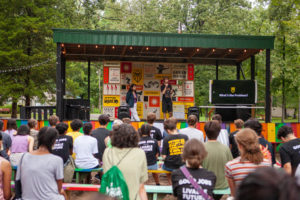
One of the camp participants, Sarah Faik, a senior at Lincoln High School, says that after going to the camp she became passionate about forming a hub of Portland youth activists to promote the Green New Deal for Schools campaign in her city. Taking this enthusiasm with her as she travels to Washington in support of the bill, Faik says, “We need to show up and we need to tell them that they need to do something about it.”
As climate activists aim to transform the school system, they gear their focus toward Black and Brown communities. Historically, BIPOC neighborhoods have been segregated, neglected and grossly overlooked by state and federal governments. This has resulted in these communities being hit the hardest by the effects of the climate crisis. According to Sunrise’s plan of action, these neighborhoods need support systems put in place to provide timely relief and aid for the areas that need it most.
“It’s about solving the climate crisis, but it’s also about confronting decades of systemic racism in our school system,” says Crandall.
In addition to the work of youth activists, the Green New Deal for Public Schools bill is integral to ensuring that the campaign’s demands are implemented in all American schools — not just wealthy ones.
Wealthier schools, including Grant, have the ability to fundraise the money they need to implement changes. However, not all schools have this privilege. The Green New Deal for Public Schools bill would require the allocation of federal funding specifically for climate reform. This would ensure that schools with lower socioeconomic statuses have the resources they need to implement the demands of the Green New Deal for Schools.
Youth activists have worked tirelessly to advocate for a brighter future for our climate and educational systems. After years of making waves, they will come together Thursday morning demanding that our politicians take the next step towards a livable future.
“We are transforming our school systems and we are leaving no one behind,” says Crandall.


